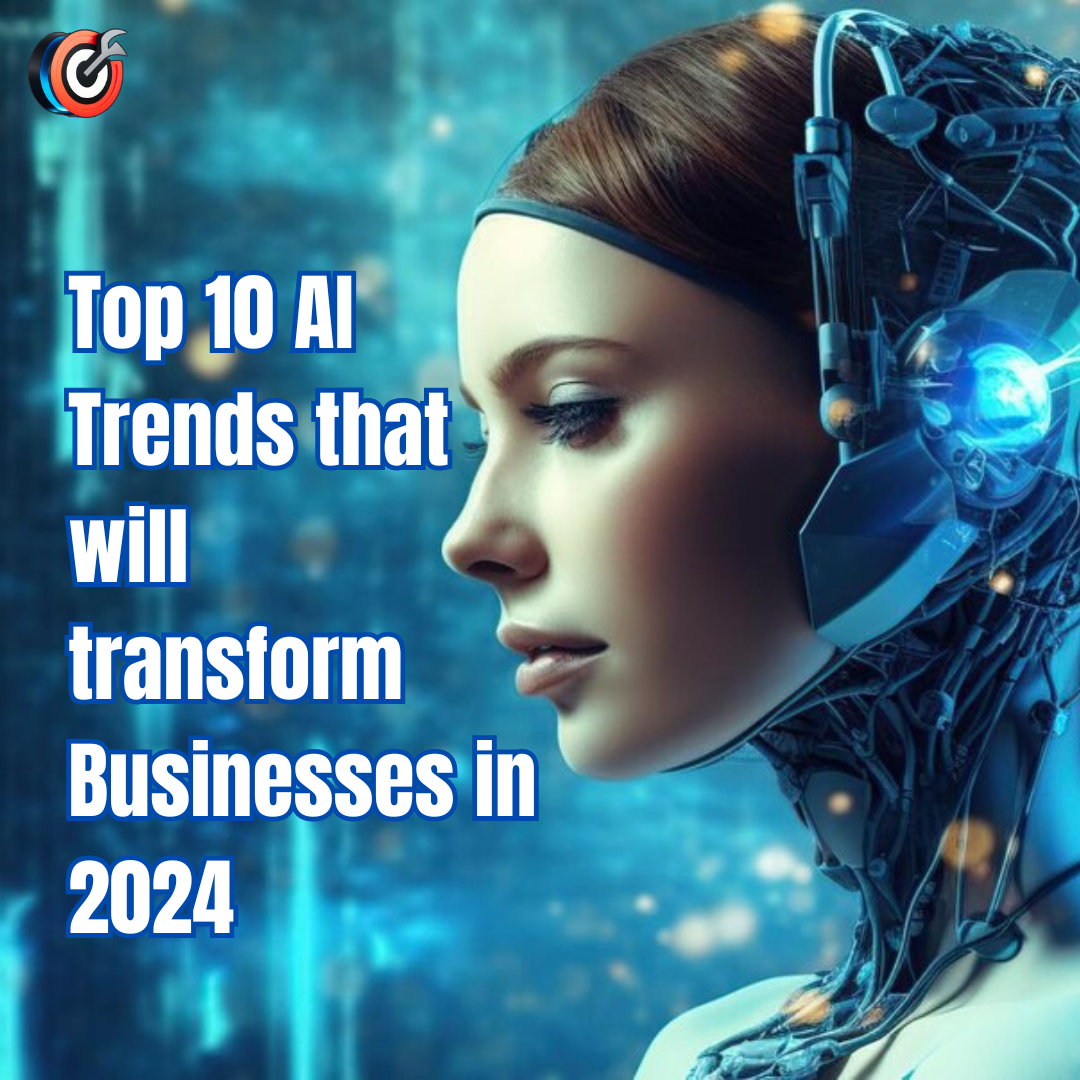
- Introduction to AI Trends in 2024
- What is Artificial Intelligence (AI)?
- Importance of AI in Business
- AI-Powered Automation
- Streamlining Processes
- Enhancing Efficiency
- Personalized Customer Experiences
- Customized Recommendations
- Tailored Marketing Campaigns
- AI in Cybersecurity
- Threat Detection and Prevention
- Data Security Measures
- Integration of AI and IoT
- Smart Devices and Networks
- Enhanced Connectivity
- AI in Healthcare
- Diagnosis and Treatment
- Drug Discovery
- AI in Finance
- Predictive Analytics
- Fraud Detection
- Natural Language Processing (NLP)
- Advanced Communication
- Language Translation
- AI Ethics and Governance
- Ethical AI Development
- Regulatory Compliance
- Conclusion: Embracing AI for Business Success
1. Introduction to AI Trends in 2024
In the rapidly evolving landscape of technology, Artificial Intelligence (AI) continues to be at the forefront, reshaping industries and revolutionizing business operations. AI, the simulation of human intelligence processes by machines, has emerged as a game-changer for businesses across various sectors. Its applications range from automation and data analysis to personalized customer experiences and cybersecurity.
What is Artificial Intelligence (AI)?
AI encompasses a range of technologies that enable machines to mimic human cognitive functions such as learning, problem-solving, and decision-making. These technologies include machine learning, natural language processing (NLP), computer vision, and robotics, among others.
Importance of AI in Business
Businesses are increasingly leveraging AI to gain competitive advantages, drive innovation, and enhance productivity. By harnessing the power of AI, companies can unlock new opportunities for growth, improve operational efficiency, and deliver superior customer experiences.
2. AI-Powered Automation
One of the prominent AI trends in 2024 is the continued integration of AI-powered automation into business processes. Automation using AI algorithms and robotics is revolutionizing industries by streamlining workflows, reducing manual errors, and optimizing resource utilization.
Streamlining Processes
AI-powered automation streamlines repetitive tasks and workflows, allowing organizations to allocate human resources to more strategic and creative endeavors. From manufacturing and logistics to customer service and finance, automation improves efficiency and accelerates business outcomes.
Enhancing Efficiency
AI algorithms analyze vast amounts of data to identify patterns, trends, and insights that humans may overlook. By automating data analysis and decision-making processes, businesses can make faster and more accurate decisions, leading to increased efficiency and cost savings.
3. Personalized Customer Experiences
In 2024, businesses are focusing on delivering personalized customer experiences powered by AI. By leveraging data analytics and machine learning algorithms, companies can tailor products, services, and marketing campaigns to individual preferences and behaviors.
Customized Recommendations
AI-driven recommendation engines analyze customer data to suggest products and services that align with each customer’s preferences, purchase history, and browsing behavior. Personalized recommendations enhance customer engagement, increase sales, and foster brand loyalty.
Tailored Marketing Campaigns
AI enables businesses to segment their target audience based on demographics, interests, and purchasing behavior, allowing for the creation of highly targeted marketing campaigns. By delivering relevant content and offers to specific customer segments, companies can improve conversion rates and maximize marketing ROI.
4. AI in Cybersecurity
As cyber threats continue to evolve in sophistication and scale, AI is playing an increasingly critical role in cybersecurity. In 2024, businesses are deploying AI-powered solutions to detect and mitigate cyber threats in real-time.
Threat Detection and Prevention
AI algorithms analyze network traffic, user behavior, and system logs to identify anomalies and potential security breaches. By detecting threats in real-time, AI-powered cybersecurity solutions enable organizations to proactively respond to cyber attacks and protect sensitive data.
Data Security Measures
AI-driven encryption and authentication technologies enhance data security by safeguarding confidential information from unauthorized access and data breaches. By adopting AI-powered data security measures, businesses can mitigate risks and comply with regulatory requirements.
5. Integration of AI and IoT
The integration of AI and the Internet of Things (IoT) is another key trend shaping the business landscape in 2024. By combining AI algorithms with IoT sensors and devices, businesses can create intelligent systems that optimize operations and improve decision-making.
Smart Devices and Networks
AI-enabled IoT devices and networks collect and analyze real-time data to optimize processes, monitor equipment performance, and predict maintenance needs. From smart manufacturing and logistics to smart cities and healthcare, AI and IoT integration revolutionize how businesses operate and deliver value.
Enhanced Connectivity
AI-powered IoT platforms enable seamless connectivity and communication between devices, allowing for centralized control and management. By harnessing the power of AI and IoT, businesses can create interconnected ecosystems that drive innovation and efficiency.
6. AI in Healthcare
The healthcare industry is experiencing a significant transformation fueled by AI innovations. In 2024, AI is revolutionizing healthcare delivery, diagnosis, treatment, and drug discovery.
Diagnosis and Treatment
AI-powered diagnostic tools analyze medical images, patient data, and genetic information to assist healthcare providers in diagnosing diseases and planning personalized treatment strategies. By leveraging AI algorithms, healthcare organizations can improve patient outcomes, reduce diagnostic errors, and enhance clinical decision-making.
Drug Discovery
AI accelerates drug discovery and development by analyzing vast datasets, predicting molecular interactions, and identifying potential drug candidates. By harnessing AI-driven drug discovery platforms, pharmaceutical companies can expedite the development of new therapies and bring them to market faster.
7. AI in Finance
The financial services industry is embracing AI technologies to drive innovation, improve decision-making, and enhance customer experiences. In 2024, AI is reshaping various aspects of finance, including predictive analytics and fraud detection.
Predictive Analytics
AI algorithms analyze financial data, market trends, and consumer behavior to forecast future outcomes and identify investment opportunities. By leveraging predictive analytics, financial institutions can optimize portfolio management, mitigate risks, and improve investment strategies.
Fraud Detection
AI-powered fraud detection systems analyze transaction data and user behavior to detect and prevent fraudulent activities in real-time. By leveraging machine learning algorithms, banks and financial institutions can identify suspicious patterns, authenticate users, and prevent financial losses due to fraud.
8. Natural Language Processing (NLP)
Natural Language Processing (NLP) is a branch of AI that enables computers to understand, interpret, and generate human language. In 2024, NLP technologies are revolutionizing communication and language translation.
Advanced Communication
NLP-powered chatbots and virtual assistants enable natural language interaction between humans and machines, enhancing customer service and support experiences. By understanding and responding to customer queries in real-time, NLP-powered conversational interfaces improve customer satisfaction and engagement.
Language Translation
NLP algorithms translate text and speech from one language to another, facilitating cross-cultural communication and collaboration. By breaking down language barriers, NLP-powered translation tools enable businesses to expand into new markets and reach a global audience.
9. AI Ethics and Governance
As AI technologies become more pervasive in society, there is a growing need for ethical AI development and governance frameworks. In 2024, businesses are prioritizing ethical considerations and regulatory compliance in their AI initiatives.
Ethical AI Development
Businesses are adopting ethical guidelines and principles to ensure that AI systems are developed and deployed responsibly, respecting human rights, privacy, and fairness. By embedding ethical considerations into the design and implementation of AI solutions, organizations can build trust with customers and stakeholders.
Regulatory Compliance
Governments and regulatory bodies are implementing policies and regulations to govern the use of AI and mitigate potential risks. In 2024, businesses are proactively complying with regulatory requirements and industry standards to ensure the responsible use of AI and protect against legal and reputational risks.
10. Conclusion: Embracing AI for Business Success
In conclusion, the top 10 AI trends in 2024 are reshaping businesses and industries, driving innovation, efficiency, and growth. From AI-powered automation and personalized customer experiences to cybersecurity and healthcare advancements, businesses are harnessing the power of AI to stay competitive and meet evolving consumer demands. By embracing AI technologies and adopting ethical and responsible practices, organizations can unlock new opportunities, drive value, and thrive in the digital era.
To ensure the ethical use of AI, businesses should prioritize transparency, accountability, and fairness in AI development and deployment. They should also engage with stakeholders, including customers, employees, and regulators, to address ethical concerns and establish clear guidelines for AI use.
Some potential risks associated with AI adoption in businesses include job displacement due to automation, bias in AI algorithms, data privacy concerns, and cybersecurity threats. It’s essential for businesses to mitigate these risks through careful planning, robust security measures, and ethical AI practices.
AI can improve cybersecurity in businesses by enabling real-time threat detection and prevention, enhancing data security measures, and automating incident response processes. By leveraging AI-powered cybersecurity solutions, businesses can detect and mitigate cyber threats more effectively, protecting sensitive data and infrastructure.
AI plays a crucial role in personalized customer experiences by analyzing customer data, predicting preferences, and delivering tailored recommendations and content. AI-driven recommendation engines and chatbots enable businesses to engage with customers on a personalized level, improving satisfaction and loyalty.
Businesses can leverage AI for financial decision-making by using predictive analytics to forecast market trends, identify investment opportunities, and optimize portfolio management. AI-powered fraud detection systems also help financial institutions detect and prevent fraudulent activities, minimizing financial risks.




